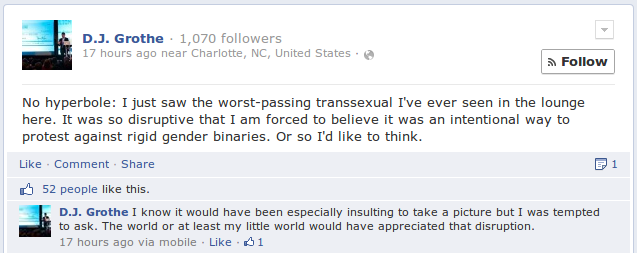
A couple of days ago DJ Grothe, president of the James Randi Educational Foundation, posted a transphobic status update on Facebook reading
While it is certainly possible this person, who Grothe assumed to be a transsexual, was indeed trying to challenge the gender binary, his post is not. The very idea of passing is derived from gender binary thinking. If his intention was to challenge the gender binary with this post he is completely ignorant of the challenges trans* people face; or he is just trying to get away with being an insensitive asshole. The core message here is that gender non-conforming people are hilarious and should be taken pictures of — if it wasn’t so rude to do so that is. He does at least realise that much. Maybe it struck him that if someone came up to him and said “lol, you look so gay, can I take a photo of you to show my buddies?” it wouldn’t be so pleasant? Let’s hope so. It would be a start.
After getting some negative reactions in the comments, he responded with:
No DJ, mocking is not only saying “she was bad or wrong”. Mocking is also having a laugh at her expense behind her back. The fact that he acknowledge that “rigid gender binaries” is an issue, while not realising his sensationalist post is rooted in normative gender binary thinking, is baffling. There are so many layers of unchecked privilege to peel off, I barely know where to start … and yes, I do use the p-word. Privilege is exactly what makes a person, who I would guess knows very well what discrimination based on sexual orientation and maybe expression feels like, think it is fine to use derogatory language towards other identities.
Firstly there is male privilege, something we all know very well DJ Grothe is utterly and completely blind to. That is nothing new, and anyone following the harassments-at-TAM cases over the last few years would be aware of this. Secondly there is cis privilege. Here’s a list of 30 types of cis privilege you can look through to get an idea what it is all about. They list some of the multitude of challenges trans* people meet in every day life, and that most cis people aren’t even aware of. I’ll quote a few that are directly relevant in this case.
If you’re a cis person …
4. Your validity as a man/woman/human is not based on how much surgery you’ve had or how well you “pass” as non-transgender.
5. You have the ability to walk through the world and generally blend-in, not being constantly stared or gawked at, whispered about, pointed at, or laughed at because of your gender expression.
18. Hollywood accurately depicts people of your gender in films and television, and does not solely make your identity the focus of a dramatic storyline, or the punchline for a joke.
People who look trans* aren’t usually going around trying to be disruptive and fight the gender binary any more than black people in a fancy cars are driving them to fight racism and challenge police bias. We are all just people trying to live our lives in peace. I myself am a trans woman who happen to pass very well because I have an underlying hormonal condition that may or not be intersex related. Due to this I enjoy cis privilege — to an extent. Julia Serano has written an excellent book about how it is to be a trans woman in a cis world, and the conditional cis privilege that comes with passing is one of the topics she analyses in detail. I really encourage people to read her book in order to gain some insight into all the grey areas that exist between cis and trans.
Even if people I meet don’t usually read me as transsexual, I still have to face some of these challenges every time I show my ID, as it still lists me as male. This causes problems on a multitude of levels, but I still experience less discrimination when I am outed because I still look like a woman and most people therefore find it hard to see me as trans*. The cis presumption is so strong that they sometimes refuse to let go of it.
The paradox of initially refusing to accept a trans* person as trans* if they pass is also a form of discrimination because it erases us. I don’t want to have my trans* identity erased just because it isn’t obvious. It is a core part of who I am. This is far from true for every trans* person you meet though, for complex reasons that I won’t go into. (Still, it is never ok to out a trans* person and rob them of control over social situations.) The point is that passing isn’t something that is available to everyone for various reasons. No person, cis or trans*, should be held up to passing standards. (Yes, transphobia sometimes happens to cis people too.) A person, any person, should be able to express themselves in any way they like and not have their expression deemed as a success or failure based on assumed goals or intentions.
Trans women are, like all women, held up to unrealistic beauty standards that every single woman fails to meet. For women who have gone through masculinisation to one degree or another these ideals are even harder to satisfy. The assumption that it is the person that fails is poison. It isn’t the person who’s failing, it is the standards. Grothe’s comment is deeply rooted in sexism sprinkled with more than a little transphobia, and is in no way vindicated by the reference to the evil gender binary. Even worse are some of the comments of support. The “I know trans* people and I don’t think that was offensive” type defence some use is just facepalm-worthy.







Very well written.
“For women who have gone through masculinisation to one degree or another these ideals are even harder to satisfy”
I am so relieved you had this sentence in your article. As a heterosexual cis-woman with traditionally masculine features (large nose, cleft chin, thin lips) I have experienced uncomfortable public gender questioning. I have always had these features, but it seems as I age the comments become more frequent (either overheard or direct). I often wonder if my face is actually changing so much as to confuse certain people or if displaying aggression towards nonconforming women is far more common. In either case, I experience a lot of distress from having to “buck up” to go out in public and pretend the opinions of strangers don’t matter. Of course, even if I have a “good” time out, meaning no comments, I am constantly wondering if everyone is thinking I look like a man and just being considerate enough to leave me alone.
I am reluctant to say I know exactly where you are coming from because privilege does apply to me in many ways. However, I can relate to not being allowed to be woman when that’s exactly who I am.
Thank you for this comment. You aren’t the first person to tell me about such experiences, which is why I added this part in the first place. Misogyny and transphobia are clearly overlapping issues.
I was invited along to a Julia Serano event a couple of weeks ago where she spoke regarding her book: ‘Excluded: Making Feminist and Queer Movements More Inclusive’. Seems somehow extremely relevant as well.
Yeah I’m pretty sure it is. I have bought it, but not read it yet. I’m getting to it soon. 90% done with book 4 of A Song of Ice and Fire :)
Westeros has its own gender issues!
*applause*! Great post, Veronica.
Exceptional post, brilliant stuff. Thanks.
opportunity missed – you would think that D.J. would be open to differences, and rather than post about what he saw, why did he not sit down and ask if person would give him an interview. Perhaps said person was trying to make a point, perhaps the person had something interesting to say, or perhaps the person has no fashion sense, either way, he would have built a bridge rather then burning one behind him.